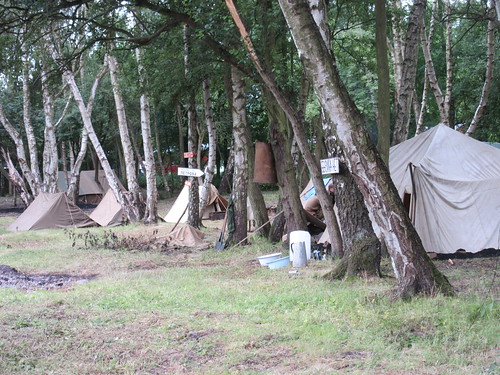 Tents in the wooden area, with the Russian 2nd Guards Rifle Division in the foreground.
Tents in the wooden area, with the Russian 2nd Guards Rifle Division in the foreground.
With my interest in Burma, I was pleased to see a small group representing the W.A.S.(B) - the Women's Auxiliary Service (Burma) which operated from 1942 to 1946. There's a brief article about the wartime work of W.A.S.(B) on Wikipedia here.

A wartime picture of a W.A.S.(B) Canteen (Photo: Wikipedia via Creative Commons).
Whilst preparing our locomotive we were visited by an American lady War Correspondent re-enactor who had based her character on a real wartime journalist who worked for a Chicago newspaper.
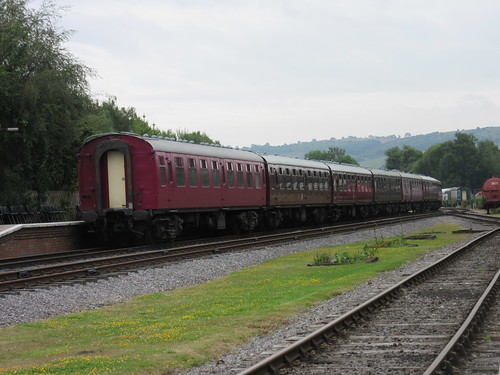 The 7-coach train stabled in the platform at Rowsley. The 'Class 31' is out of sight at the far end of the stock.
The 7-coach train stabled in the platform at Rowsley. The 'Class 31' is out of sight at the far end of the stock.
We were 'booked' to marshal 'Lord Phil' on the north end of the 7-coach train, with the 'Class 31' on the south end. I'd expected to find our locomotive turned so that we worked 'chimney leading' coming back from Matlock, as we had done for the 1940s Weekend in 2014 and 2013, but 'Lord Phil' had not been turned (drawing critical comments from a couple of enthusiasts who thought working bunker first was 'inelegant' (their description was rather more 'earthy'). We were hooked onto the train in good time and the 'Class 31' had been left coupled to the stock overnight. There were lots of people arriving, many of them in civilian or military dress for the period. The first train at 11:15 was pretty crowded.

Civilian and military dress for the period on display.
During the day, we completed the five round trips to Matlock Town station without much difficulty. Some variety was introduced since we were working bunker-first at the north end (although we'd worked like this earlier in the year when the water tank at the south end of Rowsley station was found to be empty, as described here). We also had the relative luxury of more conventional watering facilities at the north end of Rowsley (avoiding the need to drag fire hoses around, as is the case currently at the south end).
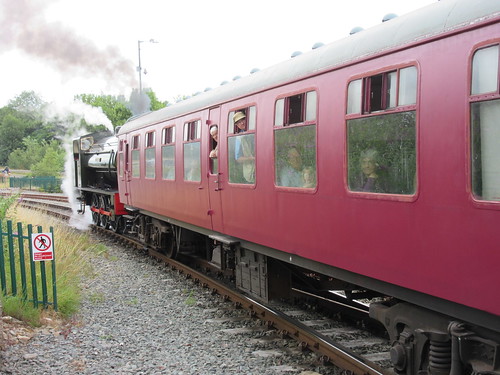 'Lord Phil' at Matlock Town, ready to return to Rowsley.
'Lord Phil' at Matlock Town, ready to return to Rowsley.
Wartime entertainment was provided throughout the day in a large, aluminium-framed marquee adjacent to the station at Rowsley.
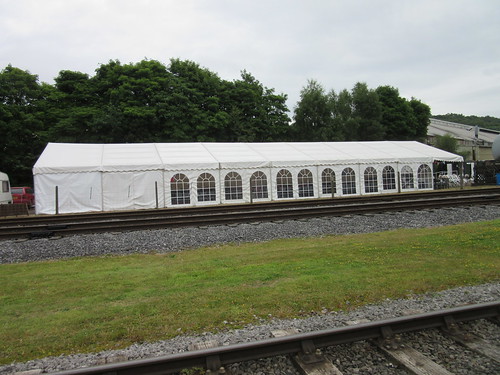 The marquee at Rowsley.
The marquee at Rowsley.
During the day I managed a brief visit to the marquee, in time to see Paul Harper introduce Sue and Steve Mace's exuberant dancing to the music of the Ashby Little Big Band. With the band's line-up of saxophones, they certainly captured the Glenn Miller swing style always associated with the second World War.
 Sue and Steve Mace dance to the music of the Ashby Little Big Band.
Sue and Steve Mace dance to the music of the Ashby Little Big Band.
The marquee was always busy with people enjoying the entertainment and making full use of the bar, which was being looked after by Richard. In addition, the LMSCA were operating a refreshment stall.
 The LMSCA refreshment stall in the marquee.
The LMSCA refreshment stall in the marquee.
The Picnic Area featured displays of civilian and military vehicles of the period, together with a number of trade stands.
 Part of the display of civilian vehicles.
Part of the display of civilian vehicles.
The afternoon features a battle re-enactment. Working on the train, you don't get to see the action because the train is sent to Matlock before it starts and isn't allowed to return until the re-enactment has finished. All the public are moved from the Picnic Area to the east side of the railway and, whilst the train is absent, the platform forms a viewing area for the public.
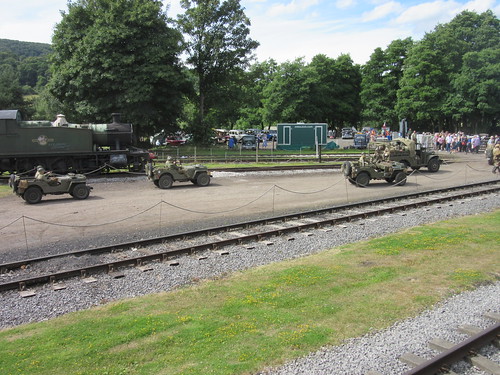 Prior to the battle re-enactment, the Americans take up their initial positions whilst the public are moved from the Picnic Area to the east side of the railway.
Prior to the battle re-enactment, the Americans take up their initial positions whilst the public are moved from the Picnic Area to the east side of the railway.
I understand the dramatisation featured German troops overwhelming the Russian camp and subsequently surrendering to a counter-attack by Americans and Russians with superior firepower. The re-enactment represented the final period of WWII and concluded with an announcement that the German forces had capitulated so that the war in Europe was over.
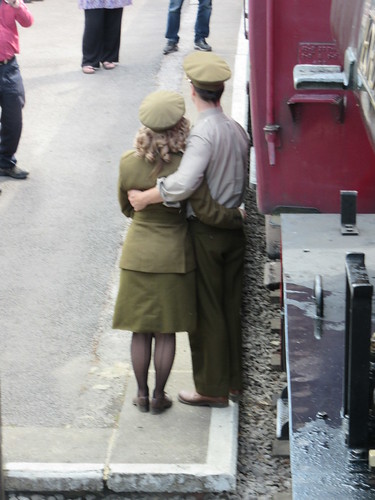
"Happy Days are here again!"
Related posts/pictures
I've participated in the 1940s Weekend at Peak Rail a number of times.
2014 event (pictures only).
2013 event (article with link to pictures).
2012 event (article with link to pictures).
2009 event (article with link to pictures).
2008 event (article with link to pictures).
2007 event (pictures only).
2006 event (pictures only).
My pictures of the 2015 event
Peak Rail 1940s Weekend, 2015
